Table of Contents
Get started with MyPerfectResume today!
- Build a resume on any device
- Pick an ATS-friendly template
- Tailor with AI copy suggestions
Why this resume works
- Quantifies accomplishments: By including measurable accomplishments like optimizing reimbursement rates by 35% and saving $50K annually, the applicant showcases real-world impact and value.
- Showcases career progression: The transition from claims processing analyst to reimbursement specialist reflects a clear path of growing expertise and responsibility within healthcare revenue management roles.
- Illustrates problem-solving ability: Innovative solutions like reducing denials by 18% through error identification illustrate strong problem-solving skills and critical thinking.
More Reimbursement Specialist Resume Examples
See our reimbursement specialist resume examples to learn how to showcase your billing expertise, claims processing skills, and attention to detail. These human resources resume samples will help you craft a resume that highlights your healthcare industry experience effectively.
Entry-Level Reimbursement Specialist
Why this resume works
- Centers on academic background: Featuring an MBA in healthcare management and a Bachelor of Science, the applicant’s education section emphasizes strong academic achievements early in their career.
- Effective use of keywords: Using role-specific keywords like “claims processing” and “medical billing,” the applicant ensures their resume is optimized for applicant tracking systems (ATS).
- Shows digital literacy: Skill with tools that streamline claim systems highlights the applicant’s computer skills and digital readiness for modern workplaces.
Mid-Level Reimbursement Specialist
Why this resume works
- Points to measurable outcomes: By showcasing achievements like increasing reimbursement by 20%, the applicant reveals a strong ability to drive financial outcomes in healthcare billing roles.
- Demonstrates language abilities: The applicant’s language skills in Spanish, French, and German facilitate cross-cultural communication, broadening client engagement possibilities significantly.
- Displays technical expertise: Certified skills in medical billing and coding underline the applicant’s technical expertise important for handling complex reimbursement processes efficiently.
Experienced Reimbursement Specialist
Why this resume works
- Lists relevant certifications: The applicant’s certifications emphasize expertise in revenue cycle management, reflecting a commitment to staying current in medical billing practices.
- Showcases impressive accomplishments: By showcasing achievements like cutting costs by 15%, the applicant reveals senior-level performance and impactful business contributions.
- Sections are well-organized: Sections are neatly organized with bullet points, allowing the reader easy access to key information and making scanning the resume simple and effective.
Reimbursement Specialist Resume Template (Text Version)
Olivia Rodriguez
Riverside, CA 92514
(555)555-5555
Olivia.Rodriguez@example.com
Skills
- Medical Billing
- Claims Management
- Revenue Cycle Optimization
- Healthcare Compliance
- Data Analysis
- Problem Solving
- Financial Reporting
- Project Coordination
Languages
- Spanish – Beginner (A1)
- German – Beginner (A1)
- French – Intermediate (B1)
Professional Summary
Dedicated reimbursement specialist skilled in optimizing revenue cycles, reducing denial rates, and implementing streamlined billing solutions. Proven track record of achieving measurable improvements in claims management while ensuring compliance with healthcare standards.
Work History
Reimbursement Specialist
Medicare Solutions Inc. – Riverside, CA
January 2023 – June 2025
- Optimized reimbursement rates by 35% through analysis
- Managed disputes and resolved claims, achieving 99% accuracy
- Reviewed billing processes, saving K annually
Revenue Recovery Coordinator
Paramount Billing Services – San Francisco, CA
January 2020 – December 2022
- Reduced invoicing errors by 20% through training programs
- Monitored receivables, ensuring compliance with policies
- Improved monthly collections by 0K for higher efficiency
Claims Processing Analyst
Echo Healthcare Billing Group – Riverside, CA
January 2017 – December 2019
- Identified coding errors, reducing denials by 18%
- Processed claims, achieving 98% timely submission rate
- Compiled reports that streamlined workflows by 25%
Certifications
- Certified Revenue Cycle Professional – Healthcare Financial Management Association
- Medical Billing and Coding Specialist – American Academy of Professional Coders
Education
Master’s in Health Administration Healthcare Revenue Management
University of Chicago Chicago, Illinois
December 2016
Bachelor of Science Healthcare Business Administration
Indiana University Bloomington Bloomington, Indiana
December 2014
Related Resume Guides
Advice for Writing Your Reimbursement Specialist Resume
Dive into our tips on how to write a resume for a reimbursement specialist position and discover how to highlight your skills in claims processing, insurance verification, and patient billing.

Highlight your most relevant skills
Listing relevant skills on your resume shows employers you have the abilities needed for the role. A dedicated skills section helps highlight what you can do well, making it easier for hiring managers to see your strengths at a glance.
It’s ideal to balance technical skills, like knowledge of billing software and coding systems, with interpersonal skills, such as communication and problem-solving. This mix shows you’re not only good with numbers but also able to work well with others.
Make sure to weave key skills into your work experience section, too. This way, you can show how you’ve used these skills in real-life situations. For example, mention how your attention to detail helped you spot errors in claims or how your customer service skills improved patient interactions. By doing this, you give concrete examples of your abilities, making your resume stronger and more memorable.
Select a resume format that highlights your expertise in billing systems, claim processing, and reimbursement procedures.
Showcase your accomplishments
When organizing your work experience as a reimbursement specialist, list each job in reverse chronological order. This means you start with your most recent position and work backward. For each role, include the job title, employer’s name, location, and employment dates. By structuring your resume this way, hiring managers can easily follow your career path and see how you’ve progressed over time.
Turning responsibilities into achievements is key to making your resume stand out. Instead of just listing duties, think about what measurable results you achieved. Did you help reduce costs by 15%?
Maybe you improved processing times by 20% or resolved claims faster than before. Using numbers like these makes your accomplishments clear and impactful. Action words such as “improved,” “reduced,” or “increased” draw attention to what you’ve accomplished.
Quantified accomplishments help hiring managers assess the value you brought to past employers quickly. They show not just what you did but how well you did it. By focusing on actions and results, you’re giving a stronger picture of your skills and impact as a reimbursement specialist. This approach tells employers why they should consider you for their team.
5 reimbursement specialist work history bullet points
- Processed over 500 reimbursement claims monthly with a 98% accuracy rate, ensuring timely payments and reducing errors by 20%.
- Collaborated with cross-functional teams to streamline reimbursement procedures, decreasing claim processing time by 15%.
- Implemented a new tracking system for denied claims, resulting in a 25% reduction in unresolved cases.
- Trained and mentored junior staff on reimbursement policies, improving team efficiency by 30%.
- Negotiated with insurance providers to resolve discrepancies in claims, recovering $100k in previously denied reimbursements.
Opt for a resume template that’s simple and neat. Use clear sections, readable fonts, and steer clear of excessive designs to help employers quickly spot your skills and experience.
Write a strong professional summary
A professional summary on a resume serves as an introduction for hiring managers, providing a snapshot of your skills and accomplishments. You can decide whether to use a summary or a resume objective based on your experience level and career goals.
A professional summary is a brief, three to four sentence overview showcasing your experience, skills, and achievements. It’s best suited for experienced applicants who want to highlight their professional identity and the value they bring to potential employers.
Resume objectives are short statements outlining career goals and intentions in applying for a particular role. They work well for entry-level candidates, career changers, or those with employment gaps. While a professional summary answers “what I’ve accomplished,” an objective addresses “what I aim to contribute.”
Now, let’s explore examples of both summaries and objectives tailored to various industries and levels of experience. Explore our library of resume examples for additional inspiration.
Reimbursement specialist resume summary examples
Entry-level
Recent health administration graduate with a focus on healthcare reimbursement processes and insurance claim management. Familiar with medical billing software, ICD-10 coding, and payer guidelines. Eager to apply knowledge of revenue cycle operations in a dynamic healthcare environment while improving patient satisfaction through efficient claims processing.
Mid-career
Experienced reimbursement specialist with 7+ years in managing complex claims and optimizing billing procedures for multi-specialty practices. Proficient in negotiating payer contracts and reducing denial rates through strategic analysis and communication. Recognized for improving cash flow by implementing streamlined workflows and fostering strong relationships with insurance providers.
Experienced
Seasoned reimbursement specialist skilled in leading teams to achieve revenue cycle excellence across large healthcare systems. Expertise in regulatory compliance, advanced coding techniques, and innovative strategies to maximize reimbursement rates. Track record of driving operational efficiencies and mentoring staff to improve performance while ensuring quality patient financial services.
Reimbursement specialist resume objective examples
Recent graduate
Dedicated and detail-oriented recent graduate with a degree in health administration seeking an entry-level reimbursement specialist position. Eager to apply knowledge of medical billing processes and insurance claims management in a collaborative healthcare setting.
Career changer
Driven professional transitioning into the role of reimbursement specialist, bringing strong analytical skills and experience from financial services. Enthusiastic about contributing to efficient claims processing and ensuring accurate reimbursement for healthcare providers.
Entry-level applicant
Aspiring reimbursement specialist with hands-on training in medical coding and billing, seeking to join a supportive healthcare organization. Committed to learning and growing within the field while assisting with timely claim submissions and improving patient satisfaction through accurate reimbursements.
Try our Resume Builder to make your reimbursement specialist resume stand out. It offers easy-to-use templates that help highlight your skills and experience clearly.
Match your resume to the job description
Tailoring your resume to job descriptions is key because it helps you stand out to employers and pass through applicant tracking systems (ATS). These systems scan resumes for specific keywords and phrases from job postings. By customizing your resume to match the job description, you increase your chances of getting noticed by hiring managers.
An ATS-friendly resume uses keywords and phrases that align with what employers are searching for. These terms should reflect your skills and experience. When a resume includes these words, it’s more likely to be selected by both software and human reviewers.
To find the right keywords in job postings, pay attention to skills, qualifications, and responsibilities that are repeated—such as claims processing, insurance verification, reimbursement procedures, or medical billing systems. These repeated phrases are often what applicant tracking systems (ATS) are designed to detect, so using exact wording when possible can improve your resume’s visibility.
Include these terms naturally throughout your resume. Rather than just stating duties, show how your work made an impact. For example, instead of writing “Handled insurance claims,” you might say “Processed insurance claims with 98% accuracy to ensure timely reimbursement and reduce billing errors.” This shows both what you did and the value you added.
Targeted resumes not only help you get past ATS but also ensure you’re presenting yourself as a strong fit for the role. By focusing on relevant skills and experiences, you’ll have a better chance of landing an interview as a reimbursement specialist.
Try our ATS Resume Checker to find over 30 common problems in your resume’s layout and wording. Get immediate tips on ways to boost your resume score.
FAQ
Do I need to include a cover letter with my reimbursement specialist resume?
Yes, including a cover letter with your resume is a smart move to distinguish yourself from other candidates. A cover letter gives you the chance to highlight your expertise in handling claims, managing billing processes, and ensuring compliance with healthcare regulations.
For instance, if the company you’re applying to has specific software or systems they use (like Epic or Cerner), detailing your experience with these can be helpful.
You might consider using our Cover Letter Generator for assistance in crafting a tailored cover letter that emphasizes your skills and experience relevant to this role.
Additionally, exploring cover letter examples can inspire and help you structure an effective narrative that aligns with industry standards.
How long should a reimbursement specialist’s resume be?
For a reimbursement specialist, a one-page resume usually does the trick to show off key skills like expertise in claims processing, billing software know-how, and strong analytical abilities.
If you have extensive experience or extra certifications related to reimbursement, a two-page resume might be more effective. Ensure everything included is relevant and shows your knack for handling complex claims efficiently.
Highlight recent roles and wins that showcase your ability to ensure accurate reimbursements. Consider checking out resources on how long a resume should be for more examples and advice tailored to where you are in your career.
How do you write a reimbursement specialist resume with no experience?
If you have no experience as a reimbursement specialist, focus on highlighting your relevant skills and education that align with the role’s responsibilities. Here are a few tips on writing a resume with no experience:
- Highlight education and coursework: Showcase any degrees or courses related to healthcare administration, finance, or business that demonstrate your understanding of medical billing and coding processes.
- Emphasize transferable skills: Use experiences from other roles or volunteer work where you’ve honed skills like attention to detail, data entry, customer service, and skill in software applications. These are critical for managing reimbursements effectively.
- Include any certifications: If you’ve completed certification programs related to medical billing or health information management, make sure they stand out on your resume.
- Demonstrate eagerness to learn: Mention any workshops or webinars you’ve attended about healthcare reimbursement processes. This shows initiative and willingness to grow in the field.
Consider tailoring your resume by using action verbs like “analyzed,” “processed,” and “coordinated” to reflect the tasks you’ll be handling as a reimbursement specialist.
Rate this article
Reimbursement Specialist
Share this page
Additional Resources
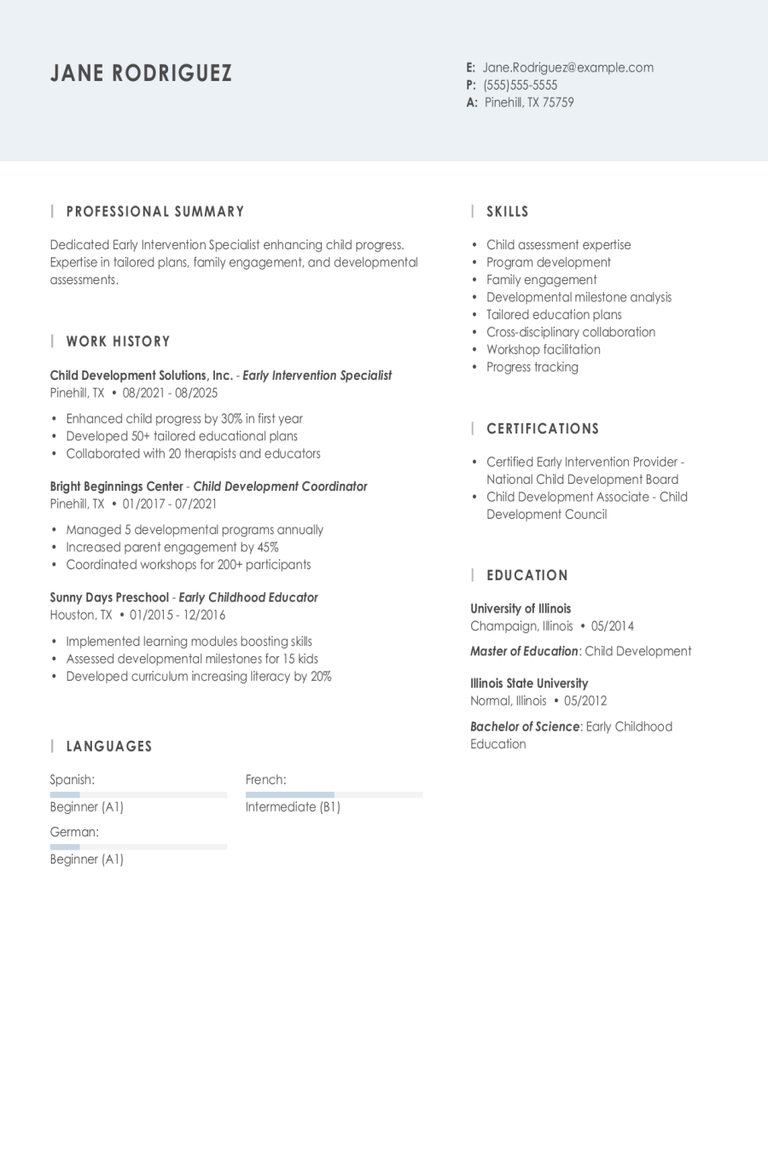
Early Intervention Specialist Resume Examples & Templates
Discover early intervention specialist resume examples and tips that will help you highlight your skills in child development, communication, and teamwork to make your experience stand out.Build my resumeImport existing
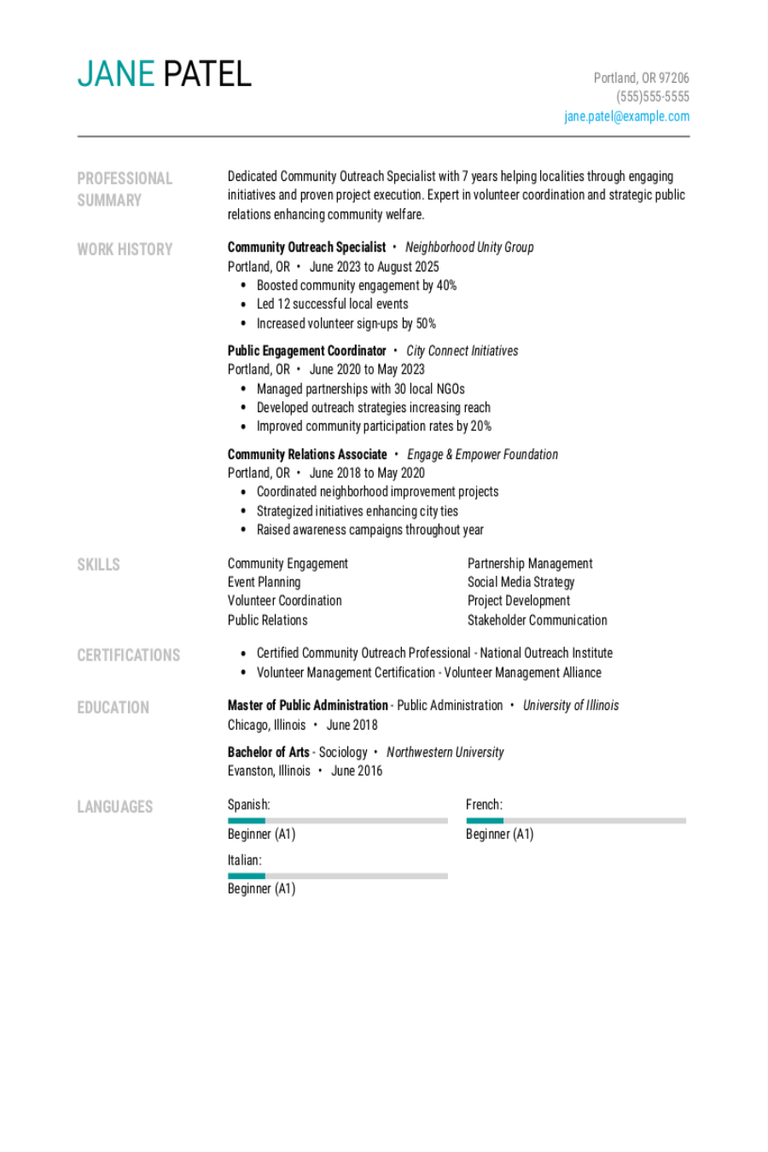
Community Outreach Specialist Resume Examples & Templates
Browse community outreach specialist resume examples and learn how to show you connect with people, plan events, and support your community.Build my resumeImport existing resumeCustomize this templateWhy this resume worksQuantifies
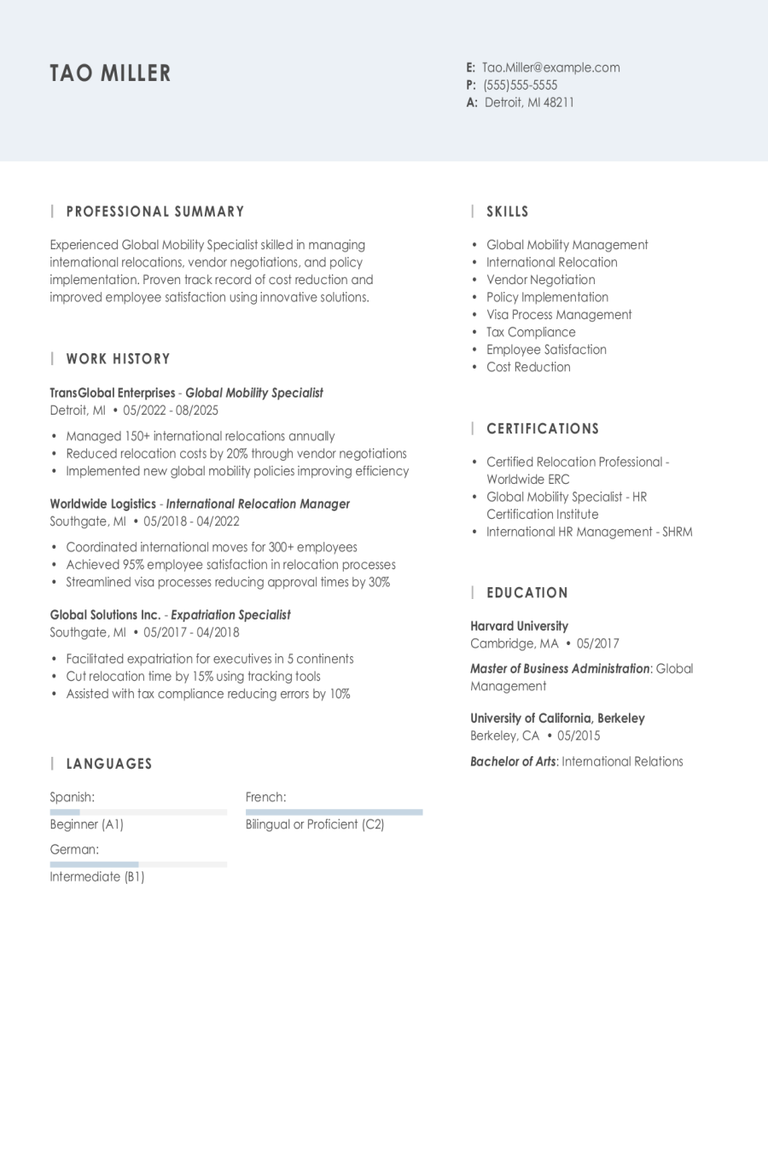
Global Mobility Specialist Resume Examples & Templates
Explore global mobility specialist resume examples to see how to showcase your skills in coordinating international assignments and managing employee relocations. Browse tips to help you highlight your expertise in
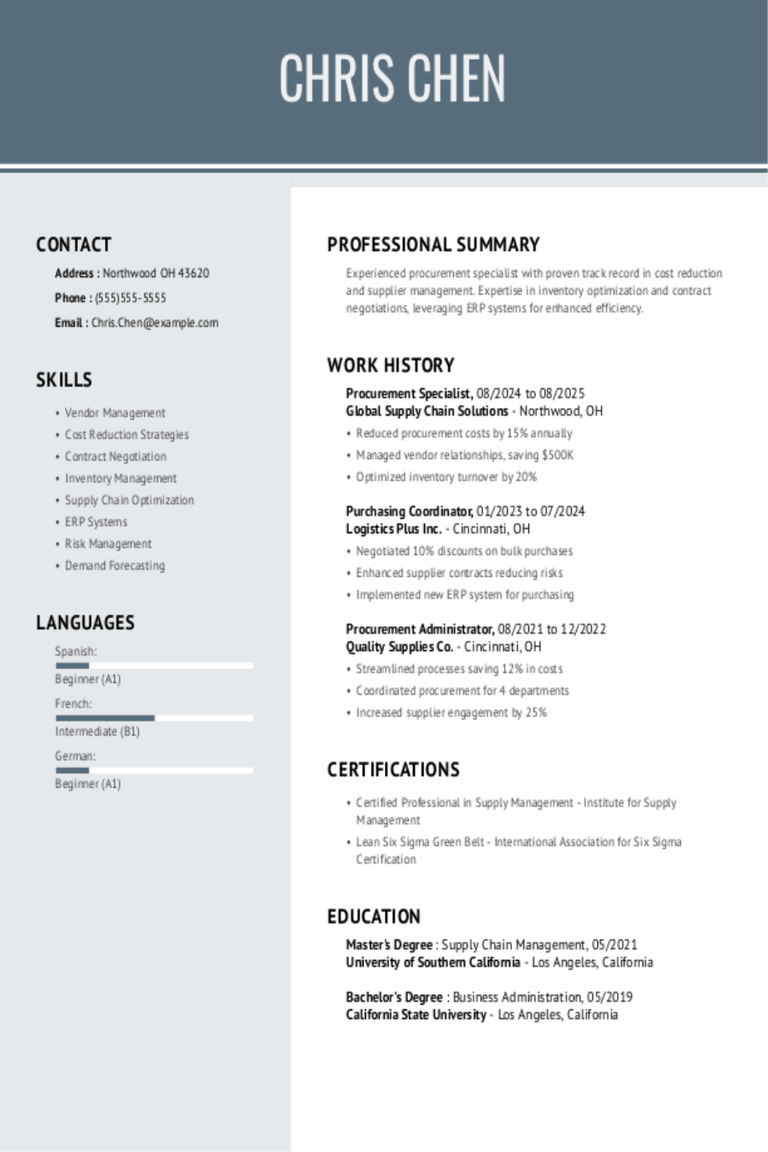
Procurement Specialist Resume Examples & Templates
Browse procurement specialist resume examples that showcase experience handling purchasing, managing vendor relationships, and negotiating contracts. These examples and tips will help you highlight your ability to secure the best
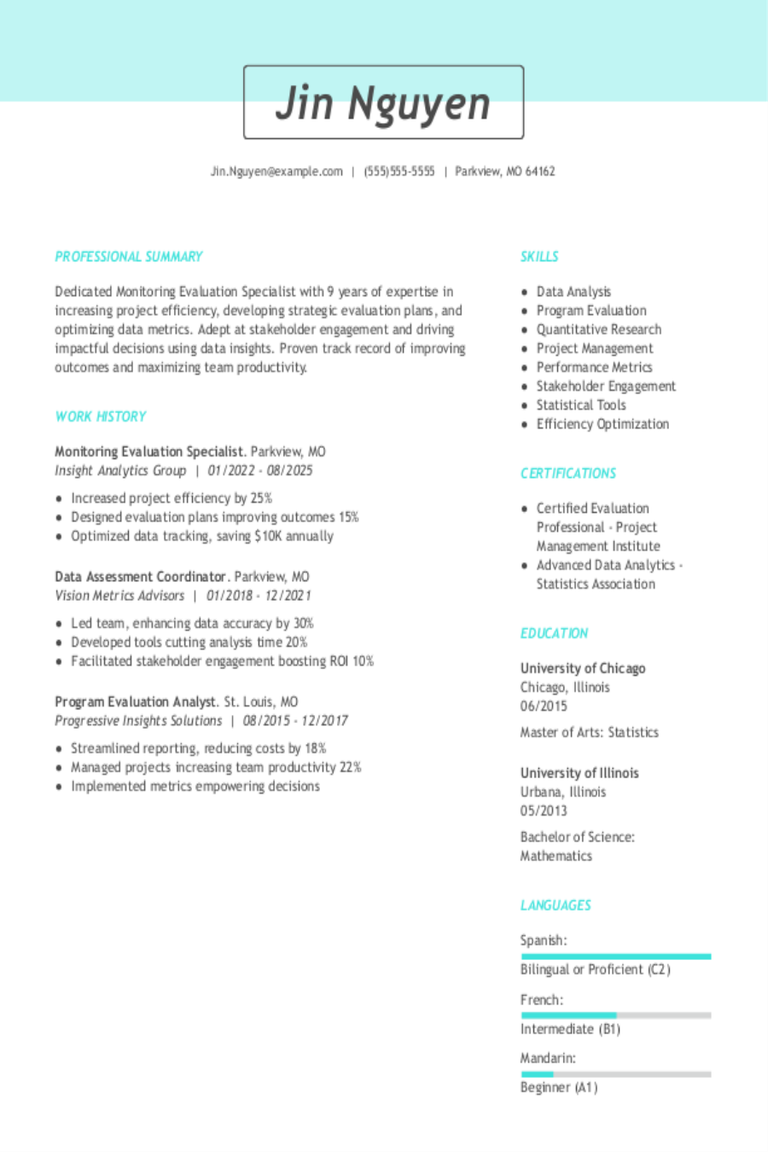
Monitoring Evaluation Specialist Resume Examples & Templates
Explore monitoring evaluation specialist resume examples and tips to help you spotlight your analytical skills and experience in tracking project success.Build my resumeImport existing resumeCustomize this templateWhy this resume worksQuantifies
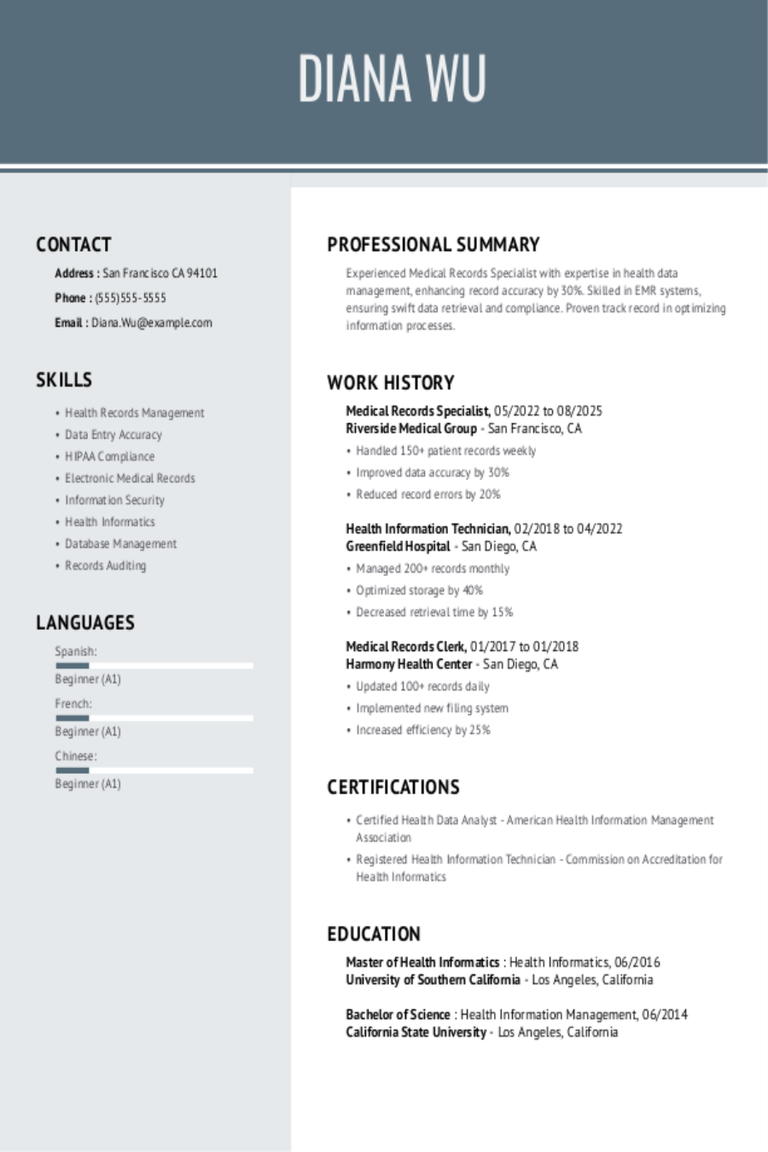
Medical Records Specialist Resume Examples & Templates
Explore medical records specialist resume examples to see how to showcase your experience organizing data, protecting patient privacy, and supporting healthcare teams. Discover tips to highlight your skills in managing
